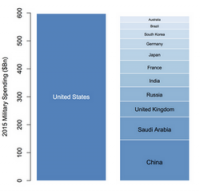-
Cost savings of LA county crime reform initiative uncertain
While a California ballot initiative reducing penalties for some criminal offenses promised to save local governments money, quantifying such savings will require significant changes in the way local agencies track workloads, according to a new report. The researchers concluded there was too little information available to create credible estimates of cost savings, despite there being evidence that many of the departments saw a drop in workloads.
-
-
Budget proposal calls for abolishing the Chemical Safety Board
Under President Donald Trump’s proposed 2018 budget, the world’s only independent body dedicated to investigating chemical-related industrial accidents would be abolished. A story in Chemical & Engineering News (C&EN), the weekly newsmagazine of the American Chemical Society, revisits why the U.S. Chemical Safety & Hazard Investigation Board was initially created, its accomplishments, and what experts say about its potential demise.
-
-
World military spending: Increases in the U.S., Europe, decreases in oil-exporting countries

Total world military expenditure rose to $1686 billion in 2016, an increase of 0.4 percent in real terms from 2015, according to new figures from the Stockholm International Peace Research Institute (SIPRI). Military spending in North America saw its first annual increase since 2010, while spending in Western Europe grew for the second consecutive year.
-
-
MIT president calls for investing in basic science to maintain U.S. edge
President Trump’s proposed budget slashes at least $7 billion in funding for science programs. That course of action would put the United States at a competitive disadvantage, argues L. Rafael Reif, president of the Massachusetts Institute of Technology (MIT). “Since World War II, the U.S. government has been the world’s biggest supporter of potentially transformative science — which is a key reason why the country continues to have the highest share of knowledge- and technology-intensive industries in the world, amounting to nearly 40 percent of the economy,” Reif writes in the May/June issue of Foreign Affairs.
-
-
The old, dirty, creaky U.S. electric grid would cost $5 trillion to replace. Where should infrastructure spending go?

The electric grid is an amazing integrated system of machines spanning an entire continent. The National Academy of Engineering has called it one of the greatest engineering achievements of the twentieth century. But it is also expensive. By my analysis, the current (depreciated) value of the U.S. electric grid, comprising power plants, wires, transformers and poles, is roughly $1.5 to $2 trillion. To replace it would cost almost $5 trillion. That means the U.S. electric infrastructure, which already contains trillions of dollars of sunk capital, will soon need significant ongoing investment just to keep things the way they are. There is no path toward shoring up or upgrading the U.S. electric grid that does not require investment – even just maintaining what we have will cost hundreds of billions, if not trillions, of dollars over the next decade. The bigger question is: As we continue to replace and rebuild this amazing grid, what technologies should we focus on?
-
-
Trump budget cuts endangering public safety: Federal union
Budget cuts being proposed by the Trump administration will make America less secure and endanger the lives of the public and our public servants, the head of the largest federal employee union said yesterday. the Trump administration is proposing double digit percentage budget cuts at the Transportation Security Administration, Federal Emergency Management Agency, and Coast Guard. Homeland Security’s budget overall would increase 6 percent, to $43.8 billion, in fiscal 2018, with most of the increase dedicated to the administration’s planned crackdown on illegal immigration.
-
-
Oroville dam danger shows how Trump could win big on infrastructure
This near catastrophe at Oroville dam — America’s tallest dam — is just the latest symptom of the chronic ill-health of America’s civil infrastructure, which has suffered from decades of under-investment and neglect. But the Oroville dam crisis could provide an unexpected opportunity for the new Trump administration to take on both problems – and win. The main problem in dealing with U.S. infrastructure is money, as up to $1 trillion would be required to repair or replace ageing dams, bridges, highways, and all the other components that support modern civilization. But there is a way for Trump to harness market forces and persuade corporate investors to invest in U.S. infrastructure. The Oroville dam near catastrophe demonstrates that some of the largest imminent threats to infrastructure will increase through climate change, and provides compelling evidence of the hard economic costs of inaction on infrastructure. If Trump moves away from climate change denial and accepts the strong balance of scientific evidence and opinion about human contribution t climate change, then a pathway to dealing with U.S. infrastructure could open up by appealing to “natural capitalism” – a market-driven economics which centers on the value of natural resources. Accepting man-made climate change could provide Trump with a chance to deliver on one of his major campaign promises, change the face of capitalism, and perhaps even save the world along the way.
-
-
DHS has found only $20 million of the $21 billion needed for border wall

President Donald Trump’s pledge to use existing funds to launch the construction of a wall on the U.S.-Mexico border has run into an obstacle: There is only little money available to start the project. DHS has identified only $20 million that can be reallocated to the $21 billion project. DHS searched for available funds only within its $376 million budget for border security fencing, infrastructure and technology. Redirecting funds from other departmental accounts would require congressional approval. The funds currently available would cover 0.1 percent of the project’s cost — or pay to build 2.5 miles of border barrier.
-
-
DHS awards U Texas San Antonio $3 million to develop, deliver cybersecurity training
The Department of Homeland Security (DHS) has selected a team led by the University of Texas at San Antonio (UTSA) to develop and deliver cybersecurity training through the Continuing Training Grants (CTG) Program. The 2016 CTG is a $3 million grant to develop and deliver cybersecurity training to support the national preparedness goal to make the United States more secure and resilient.
-
-
NIST’s regional approach to addressing U.S. cybersecurity challenge
NIST has awarded grants totaling nearly $1 million for five projects that are taking a community approach to addressing the U.S. shortage of skilled cybersecurity employees. The NIST-led National Initiative for Cybersecurity Education (NICE), a partnership among government, academia, and the private sector, will oversee the grants as part of its mission to support cybersecurity education, training, and workforce development.
-
-
TEEX Center awarded $22 million through DHS national training program

The Texas A&M Engineering Extension Service (TEEX) announced it will receive $22 million in federal funding for its National Emergency Response and Rescue Training Center (NERRTC), which provides specialized homeland security and disaster preparedness training nationwide. Since it was established in 1998, NERRTC has enhanced preparedness by training more than 560,000 emergency responders, senior officials, public works staff, and medical personnel through delivery of more than 13,000 courses to state, local, tribal, and territorial jurisdictions.
-
-
How Congress is failing on Zika
Three times Congress has taken up legislation to fund the continuing response to the Zika outbreak. Three times the bill, which would allocate $1.1 billion to fight the disease, has fallen short of attracting bipartisan support. While Congress delays action on Zika, the number of infected people keeps climbing. As of mid-September, there were over 3,000 reported cases in the fifty states and close to 18,000 when you count in U.S. territories like Puerto Rico and the Virgin Islands. One thing the Zika crisis has made clear is that solving emerging disease outbreaks increasingly involves navigating treacherous political waters. Congress’ lack of understanding of the real scope of voucher program – which aims to spur development of new drugs for neglected diseases — compromises efforts to find new ways of encouraging R&D in neglected diseases like Zika. Its inaction when it comes to extending funding for a major outbreak may endanger the health of thousands of Americans.
-
-
Sizable increase in U.S. R&D spending
U.S. research and development (R&D) performance rose to $477.7 billion in 2014 — an increase of $21.1 billion over the previous year — and is estimated to hit $499.3 billion in 2015. adjusted for inflation, growth in U.S. total R&D performance averaged 1.2 percent annually between 2008 and 2014, matching the average pace of U.S. gross domestic product (GDP).
-
-
U.S. spending on war on terror since 9/11 to reach $4.79 trillion in 2017

In 2002, Lawrence Lindsey, George W. Bush’s chief economic adviser, estimated that the cost of waging war in Iraq would not exceed $200 billion. As the fifteenth anniversary of the 9/11 attacks approach, the United States has spent or taken on obligations to spend more than $3.6 trillion in current dollars on the wars in Iraq, Afghanistan, Pakistan, and Syria and on the Department of Homeland Security. The total expenditure for the wars in the Middle East and the war on terror rises to $4.79 trillion when dedicated war spending for the coming fiscal year is added in, along with the nearly $32 billion requested for the Department of Homeland Security for 2017.
-
-
DHS awards $3 million in Small Business Innovation Research awards
The Department of Homeland Security (DHS) Science and Technology Directorate (S&T) last week announced a total of $3.1 million in competitive research awards for twenty-nine small businesses located across twelve states and Washington, D.C. Each business was awarded approximately $100,000 in preliminary funding through DHS S&T’s Small Business Innovation Research (SBIR) program. Thirty-one contracts were awarded in ten topic areas.
-
More headlines
The long view
Factories First: Winning the Drone War Before It Starts
Wars are won by factories before they are won on the battlefield,Martin C. Feldmann writes, noting that the United States lacks the manufacturing depth for the coming drone age. Rectifying this situation “will take far more than procurement tweaks,” Feldmann writes. “It demands a national-level, wartime-scale industrial mobilization.”
Trump Is Fast-Tracking New Coal Mines — Even When They Don’t Make Economic Sense
In Appalachian Tennessee, mines shut down and couldn’t pay their debts. Now a new one is opening under the guise of an “energy emergency.”
